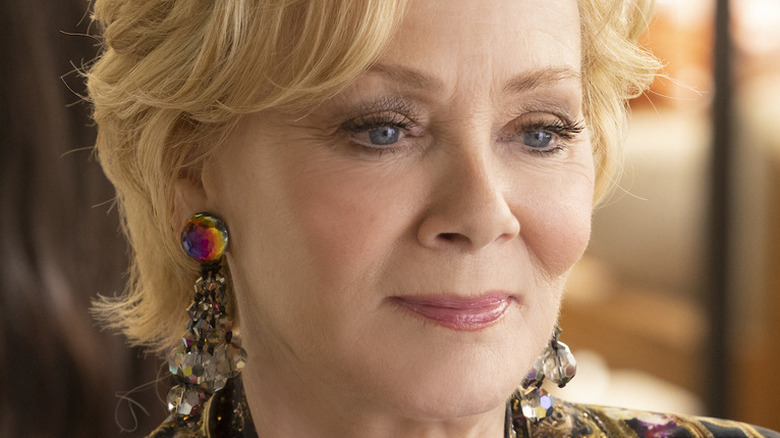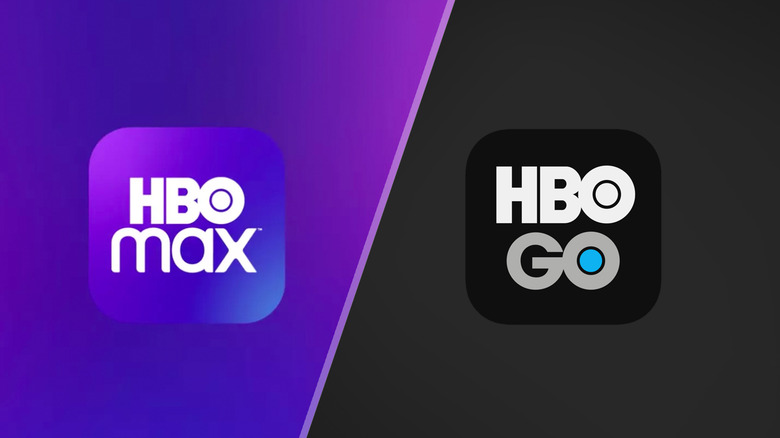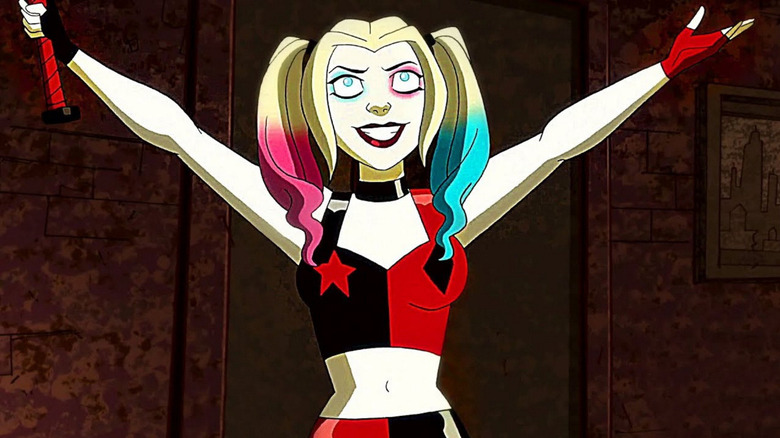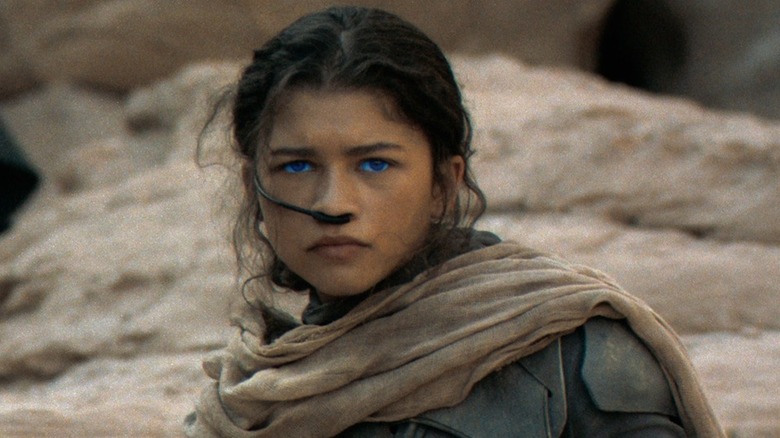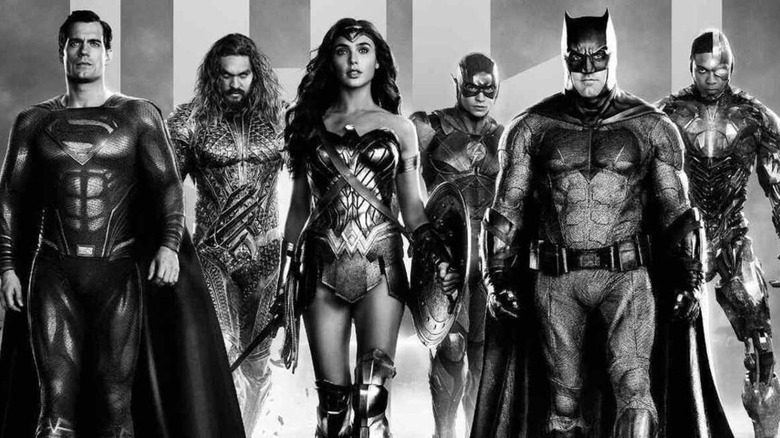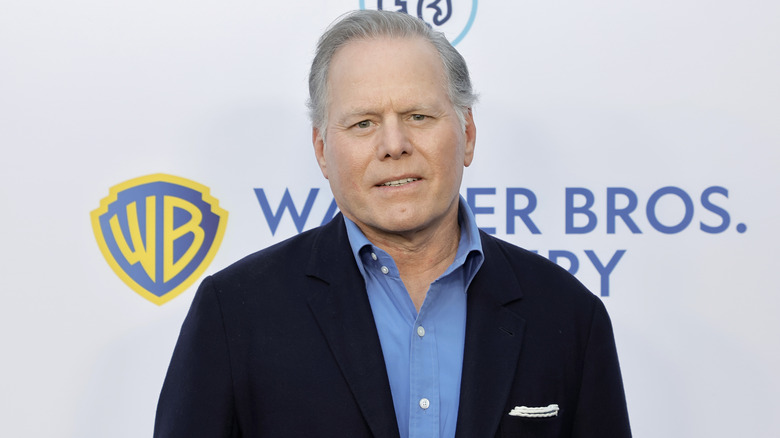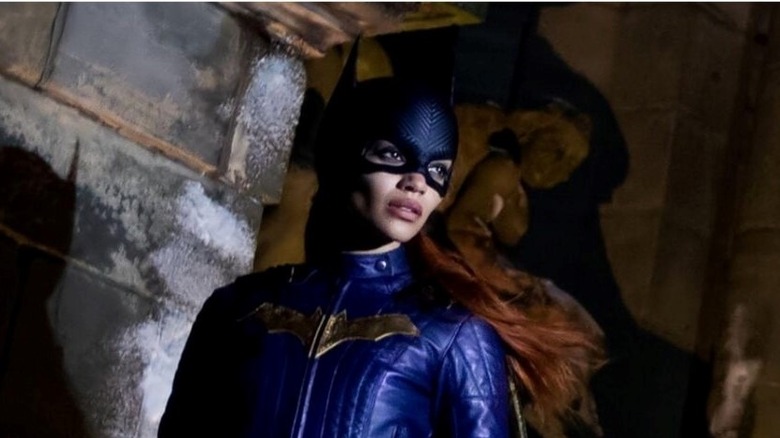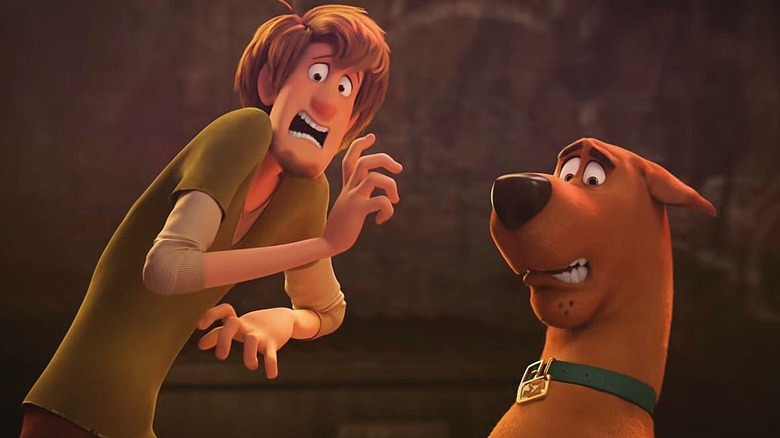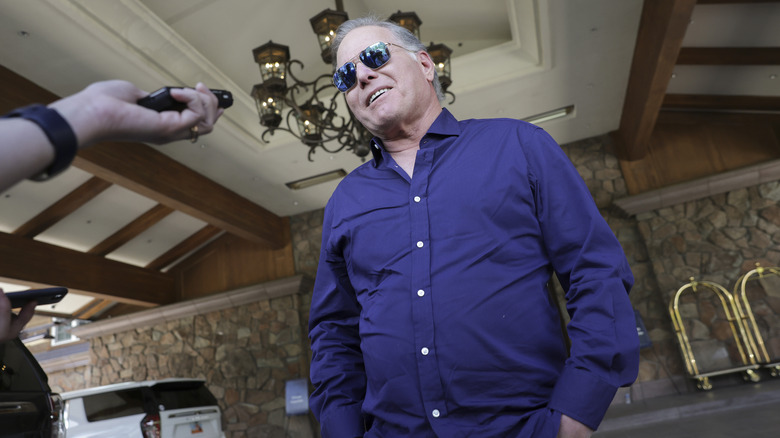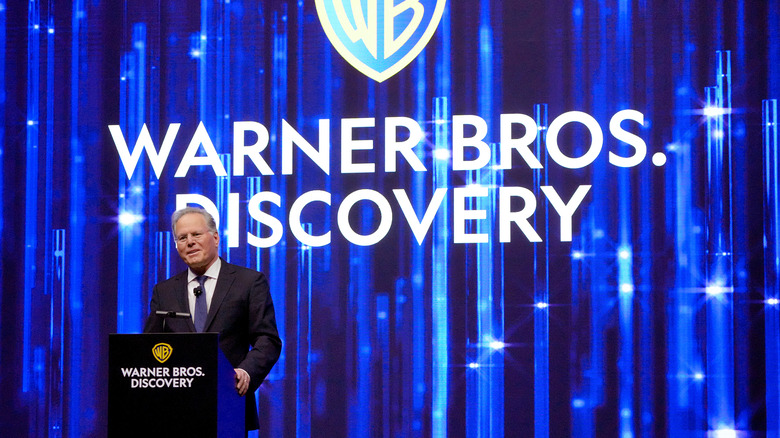The Untold Truth Of HBO Max
When HBO Max launched in May of 2020, it seemed like a game changer. Not only did WarnerMedia's contribution to the industry-wide competition for streaming supremacy provide access to the majority of the decades-spanning catalog of Warner Bros. film titles, but it also boasted hubs dedicated to Studio Ghibli, Adult Swim, Cartoon Network, Turner Classic Movies, DC Entertainment, Sesame Street, and Looney Tunes. It rolled out featuring at least 10,000 total hours of content. As an added bonus, HBO Max included a strikingly large number of titles from the esteemed Criterion Collection, to say nothing of the entire HBO television library. Its original content was slick and high budget and encompassed a wide variety of genres and subjects. Famously, HBO Max provided the eventual landing platform for the long-awaited so-called "Snyder Cut" of the film "Justice League."
But recently, the service has come under scrutiny due to new corporate edicts. So, what went wrong, and where will it go from here?
The complicated road to HBO Max
WarnerMedia was late to enter the so-called "streaming wars." By 2020, the abundance of streaming options had expanded well beyond Netflix and Hulu — there was already Amazon Prime Video, Tubi, Vudu, CBS All Access (later rebranded as Paramount+), Disney+, Apple TV+, and more, with Peacock waiting in the wings. Initial attempts by the venerable Warner Bros. brand to enter the fray were rocky, to say the least.
The first on-demand offerings from HBO came in the form of HBO on Broadband, which some users considered inadequate at best. Although free to existing HBO subscribers, HBO on Broadband only worked on Windows PCs and required an account with a particular cable provider. It was succeeded by HBO Go, a much-improved streaming model that worked on all manner of devices and launched in 2010. Compared to HBO Max, the library of original programming available to stream at the time was far less comprehensive.
Flash forward to July of 2020, and WarnerMedia has completely abandoned HBO Go and focused all their efforts on the more impressive HBO Max. When the latter was announced, there was widespread confusion about what differentiated the platforms and who had access. Fortunately, the HBO streaming presence has been clarified and consolidated ... for now.
Early success
Previous WarnerMedia CEO Jason Kilar made HBO Max the company's priority. To the surprise of many and despite the highly competitive streaming landscape, HBO Max was a resounding success. On its launch day in 2020, the app had 87,000 downloads, and ballooned to 2 million in 14 days. The most recent data has the service's subscriber base reported at 76.8 million subscribers worldwide. As of April of 2022, HBO Max had vaulted over Disney+ as the world's third-most-subscribed streaming service.
In addition to its gargantuan catalog of preexisting content, HBO Max made a splash with its high-caliber original programming. DC Entertainment in particular benefited from the new service when the DC Universe app folded into HBO Max, granting a much-larger audience for the critically acclaimed shows "Harley Quinn," which is currently in its third season, and "Doom Patrol," which is tentatively presumed to still be undergoing a Season 4 as of this writing.
The controversy over Project Popcorn
In 2020 and beyond, the COVID-19 epidemic upended the entire media landscape. Theaters shuttered, then re-opened at limited capacity. People spent months in quarantine glued to their television screens. It was a less-than-ideal time to be a filmmaker or a film distributor, but it was a boon to streaming services, particularly the freshly launched HBO Max.
WarnerMedia had an unprecedented response to the crisis, which they dubbed "Project Popcorn." This initiative debuted Warner Bros. films in theaters and on HBO Max simultaneously, including titles like Robert Zemeckis' adaptation of "The Witches," the highly anticipated superhero sequel "Wonder Woman 1984," the Oscar-nominated "Judas and the Black Messiah," the nostalgic "Space Jam: A New Legacy," James Gunn's DC caper "The Suicide Squad," the arguably unnecessary "The Many Saints of Newark," the sci-fi epic "Dune," and "The Matrix Resurrections."
Some filmmakers and industry insiders were apoplectic at this decision. In late 2021, WarnerMedia officially ended "Project Popcorn" and returned to a more traditional 45-day window of theatrical exclusivity for its titles before they became available on HBO Max.
The Snyder Cut finds a home
HBO Max provided a fortuitous and perhaps inevitable home for one of the most contentious properties in Warner Bros. history — the fabled and controversial "Snyder Cut" of the 2017 film "Justice League." Following the untimely death of one of his children, original director Zack Snyder departed the project and Warner Bros. handed the reins to Joss Whedon, who ironically (more on this later) had been developing a feature film at the studio showcasing one of Batman's sidekicks, Batgirl. The theatrical cut of "Justice League" was met with critical disdain and middling box office returns. When Snyder started stoking the flames online about a supposedly epic, unreleased director's cut of the film, ostensible fans started an ambitious and years-long campaign to see his vision restored.
Recently the "Snyder Cut" movement has come under suspicion after it came to light that many of the social media posts advocating for the film's unveiling were revealed to be the work of bot farms. Nevertheless, the enthusiasm of the fanbase was genuinely hard to deny, and Warner leadership acquiesced to spend an additional $30 million (allegedly) to complete Snyder's version of "Justice League." The four-hour-plus film was a boon to the nascent HBO Max when it arrived in March 2021. In its first week of release, HBO Max led the streaming industry in new subscribers with an astonishing increase of 64%.
A fateful merger
Motion picture studios changing corporate hands is nothing new. Over the years, Warner Bros. alone has been purchased by Seven Arts and merged with Time, Inc. into a single company which was absorbed by AT&T in 2018. But their most recent acquisition has brought with it a major change in leadership. In April of this year, AT&T spun off WarnerMedia and merged it with Discovery, Inc., best known for its reality television programming. This new company, Warner Bros. Discovery, is overseen by David Zaslav as President and CEO, a media industry veteran who cut his teeth at NBC Universal and the aforementioned Discovery Channel.
Zaslav brings with him some radical ideas about the future of WarnerMedia and its film department in particular, which had a handful of releases on deck to release directly to HBO Max. Fellow streamer Discovery+ and HBO Max will be combined into one single platform with a name to be determined. In a statement that caused some controversy, Warner Bros. Discovery CFO Gunnar Wiedenfels identified HBO Max as "male-skewing" and Discovery's programming as more successful with a female audience. While he was probably meaning to speak from a statistical perspective, it's still a groan-inducing comment.
Sweeping changes include the cancellation of Batgirl
The most headline-grabbing decisions of Zaslav's tenure at Warner Bros. Discovery so far have to be the cancellations of "Batgirl" and "Scoob!: Holiday Haunt." These films won't be in theaters; they won't roll out in a straight-to-streaming capacity; they've been completely shelved to gather dust on a server somewhere on the Warner Bros. lot. This choice sent massive shockwaves throughout the filmmaking industry.
"Batgirl" was set to star Leslie Grace in the title role as Barbara Gordon, with Brendan Fraser as the villain Firefly, J.K. Simmons reprising his role as James Gordon, and Michael Keaton returning as Batman. The film seemed poised to expand the DCEU's convoluted and ever-expanding movie multiverse, but now fans will never get to know exactly how. It's also worth noting that it would have been one of the rare superhero films to feature an Afro-Latina lead. Warner Bros. had already spent a reported $90 million on the project. Twitter, not surprisingly, had opinions as well, with some communicating their anxiety over the fate of the fellow DC film "Blue Beetle" — also featuring a Latinx lead -– which is in post-production and scheduled (for now) for August 2023. Also in jeopardy? The Sasha Calle-led "Supergirl," which anonymous tipsters told Rolling Stone might not move into production at all. In defending his "Batgirl" decision, Zaslav told investors, "We're not going to launch a movie to make a quarter and we're not going to put a movie out unless we believe in it."
The fallout from the new regime
Following the surprise shelving of "Batgirl," directors Adil El Arbi and Bilall Fallah released a joint statement on Instagram, lamenting the decision. "We are saddened and shocked by the news," they wrote. "As directors, it is critical that our work be shown to audiences." Kevin Feige, the producer of rival Marvel Studios, expressed solidarity with the directors, whom he collaborated with on episodes of the Disney+ show "Ms. Marvel," in a direct message that El Arbi made public. Leslie Grace and co-star Ivory Aquino were more diplomatic in their reactions, expressing their fondness for the cast and crew of the never-to-be-seen DC Comics adaptation.
On his "Hollywood Babble-On" podcast, filmmaker and noted comics fan Kevin Smith said it was "an incredibly bad look" to scrap "Batgirl" and that now "[Warner Bros. Discovery] has added a new fear — they may not release [a film] at all." As for the also-cancelled "Scoob!: Holiday Haunt," co-writer Paul Dini — himself no stranger to WarnerMedia, having been one of the principal architects of "Batman: The Animated Series" and subsequent DC Comics cartoon adaptations — took to Twitter to say, "Why cancel a 95% finished holiday movie this close to Fall, when you're guaranteed kids watching it from right after Halloween until at least New Years? Makes no business sense esp. as both kids & parents dug the [work in progress] screening." There have been economic repercussions as well — stocks in the newly merged company are in a freefall.
It's all about the bottom line
So why make such a dramatic and industry-upending decision? The old adage is unfortunately apt here — it's all about the money. Variety has cited unnamed insiders who claim that the decision to remove "Batgirl" and the "Scoob!" sequel from the HBO Max slate was so Warner Bros. Discovery could use the projects as a tax write-off. Additionally, they won't have the spend the millions of dollars it would take to market the films.
Per the terms of AT&T's arrangement with Discovery and WarnerMedia, the latter, once combined, inherited $43 billion in the company's debt. Once you factor in Discovery Inc.'s existing debt, the total comes to a staggering $57 billion in long term debt. Obviously, Zaslav's rationale in moving the company's focus away from their relatively successful streaming platform — including two of its more high-profile original features — was predominantly financial. Additionally, the company spent nearly $2 billion as part of its restructuring. Part of this cutthroat new corporate strategy likely comes on the heels of the revelation that streaming competitor Netflix has lost nearly one million subscribers, even if they're still claiming to turn a profit. Expect more sweeping changes at Warner Bros. Discovery as they continue to tighten their belts.
What the future holds
Zaslav's recent conference call with Warner Bros. Discovery investors was incredibly revealing with respect to the fate of HBO Max. Expect the streamer to be increasingly de-emphasized over the coming months. "We have no religion about any one platform or window versus another, and we intend to approach each and every decision through a lens of enhancing asset value against a set of financial returns. Our goal is to maximize long-term shareholder value and asset value, not just subs. We will not overspend to drive subscriber growth," he told shareholders. That probably means no more $90 million streaming-only releases. He also indicated that we can expect continued exploration into ad-supported versions of the service, which currently costs users $5 less per month than the ad-free version, and ad-only services for markets outside of the U.S.
On the positive side, expect the Warner Bros. Discovery streaming library to expand even further. As Zaslav put it, "There is a huge amount of content and [when] you look at the wealth of the TV library and the motion pictures library, [it's] not being used at all on the subscription platform." Don't be surprised if programs from Discovery's channels HGTV, Food Network, and Animal Planet are also made available. Whatever form the new subscription service takes, it's forecasted to launch in the summer of 2023. While it's still unclear what the future will hold for HBO Max, in the meantime, subscribers can still enjoy everything from "Citizen Kane" to "Euphoria."
